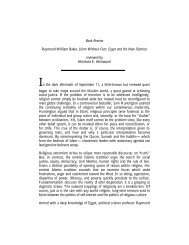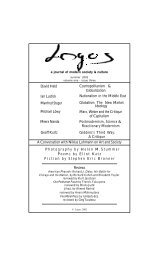Michael J. Thompson Stephen Eric Bronner Wadood Hamad - Logos
Michael J. Thompson Stephen Eric Bronner Wadood Hamad - Logos
Michael J. Thompson Stephen Eric Bronner Wadood Hamad - Logos
Create successful ePaper yourself
Turn your PDF publications into a flip-book with our unique Google optimized e-Paper software.
Stanley Aronowitz<br />
Naming the power élite as the only “independent variable” in American<br />
society, Mills was obliged to revise his earlier estimation of the labor<br />
movement. Barely eight years after designating the labor leaders “new men of<br />
power” who had to choose whether to lead the entire society in the name of<br />
working people and other subordinate groups he designated them a<br />
“dependent variable” in the political economy. Accordingly, he lost hope that,<br />
in any possible practical eventuality, working people and their unions would<br />
enter the historical stage as autonomous actors, at least until a powerful new<br />
left of intellectuals and other oppressed groups emerged to push them.<br />
Mills’s identification of power with the triumvirate of corporation, military<br />
and national state, was offered in the same period that political theorists and<br />
sociologists were proclaiming the concept of pluralism as a more accurate<br />
description. Robert Dahl’s Who Governs, a study of the city of New Haven’s<br />
power structure, construed power in the metaphor of a parallelogram of forces,<br />
none of which dominated political decision-making. Business, labor, consumer<br />
groups such as parent associations, taxpayers and other organized groups<br />
constituted power relationships through the mechanisms of compromise and<br />
consensus. Although not denying that big business and the political directorate<br />
exhibited oligarchic tendencies, Dahl vehemently refuted the concepts<br />
associated with both Marxism and élite theory that there were clearly<br />
articulated ruling groups that were the only genuine independent force. Dahl’s<br />
study became not only a model for the understanding of local power, but of<br />
national power as well. As persuasive as Mills’s argument may have been for<br />
progressives and other political skeptics, his views were subject to the severe<br />
criticism of many of his fellow academics as well as reviewers. For some he had<br />
failed to appreciate the resilience of American democracy, was importing ideas<br />
inherited from the non-applicable European context to American<br />
circumstances and, in any case, had offered yet another exercise in debunking.<br />
II<br />
HE DID HIS GRADUATE WORK AT Wisconsin under the mentorship of, among<br />
others, Hans Gerth, whose powerful mind was never matched by a body of<br />
equally compelling written work. In some respects, Mills gave an English<br />
language voice to Gerth’s ideas (although the collaboration has lately been<br />
<strong>Logos</strong> 2.3 – Summer 2003




